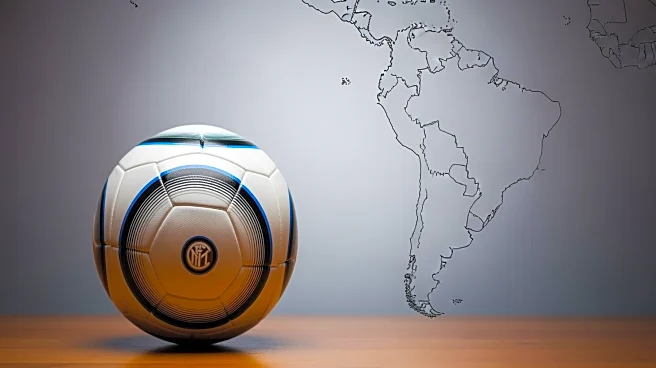What's Happening?
Inter Milan is reportedly preparing to part ways with Argentine defender Tomas Palacios during the upcoming January transfer window. According to Corriere dello Sport via FCInter1908, the club is eager
to offload Palacios, who has struggled to secure a regular spot in the team. Despite an agreement with Santos for a loan move to Brazil, Palacios opted to remain in Europe, hoping for better opportunities. The 22-year-old has only made three appearances for Inter Milan over the past 18 months, leading the club to seek alternatives in their defensive lineup. The potential departure of Palacios could pave the way for new defensive signings, as well as reinforcements on the right wing, following Luis Henrique's underwhelming performance.
Why It's Important?
The decision to offload Tomas Palacios reflects Inter Milan's strategic efforts to optimize their squad and address performance gaps. By potentially freeing up space in their defensive lineup, the club aims to enhance its competitiveness in Serie A and other tournaments. This move could also impact the transfer market, as South American clubs express interest in acquiring Palacios, potentially leading to increased cross-continental player exchanges. For Inter Milan, reinforcing their squad is crucial to maintaining their status as a top contender in Italian football, especially as they seek to improve their standings and performance in the league.
What's Next?
As the January transfer window approaches, Inter Milan is expected to actively pursue new defensive signings to replace Tomas Palacios. The club may also explore options to strengthen their right wing, addressing areas where performance has been lacking. Meanwhile, Palacios could find new opportunities in South America, where interest in his skills remains strong. The outcome of these transfers will likely influence Inter Milan's strategy and performance in the second half of the season, as they aim to bolster their squad and achieve better results.
Beyond the Headlines
The potential transfer of Tomas Palacios highlights the broader dynamics of player mobility between European and South American football markets. It underscores the challenges faced by young players in securing positions within top-tier European clubs and the strategic decisions clubs must make to balance talent development with competitive performance. This situation also reflects the ongoing evolution of football as a global sport, where cross-continental transfers play a significant role in shaping team compositions and league competitiveness.









